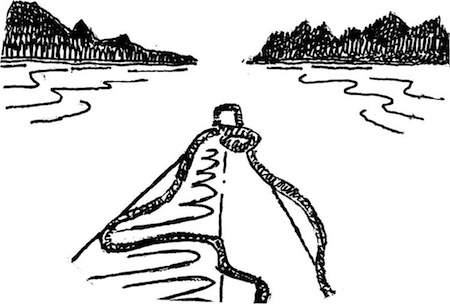A Philosophical Adventure!

Chasing Thoreau follows the course and explorations of Thoreau's time, retraced by Payne in humorous detail and observant homage to his ideas and contributions to society.
Table of Contents
Introduction
1. Reversing Course on Thoreau
Walden Pond & Concord River
2. Encounter at Walden Pond
3. Incident at the Old North Bridge
4. Journey of a Thousand Steps
Merrimack River to Atlantic Ocean
5. North to Nashua
6. Making Peace with Rapids
7. What is Progress For?
8. Camping with a Sundog
Engaging with Thoreau & his Philosophy
9. Faith in Authority
10. Doggone Coincidence
11. Wrestling with Faith
Experiment & Reflections
12. Celebrating Curiosity: How Fast Does a Snowflake Fall?
Excerpts & Sample Chapter
Introduction: Reversing Course on Thoreau
“The moment my eye fell on the advertisement, I knew what my next kayak adventure should be. The announcement from Dover Publications featured a reissued historical work written by the famous writer and naturalist Henry David Thoreau, A Week on the Concord and Merrimack Rivers. The book purported to be Henry’s account of a trip he and his older brother John took in the fall of 1839, when both men were in their early 20s. Mechanically handy lads, they built a 15-foot dory in just one week, loaded the boat with a heavy canvas tent, buffalo blankets, field-ripened melons and potatoes, and set out from their home in Concord, Massachusetts, rowing down the Concord River. This boat, incidentally, Thoreau later sold to the novelist Nathaniel Hawthorne for seven dollars. Hawthorne, who had trouble learning to maneuver the craft, admired how skillfully Henry had controlled the boat when he took him out on the river for a test drive. “Mr Thorow [sic] managed the boat so perfectly,” wrote Hawthorne, “that it seemed instinct with his own will, and to require no physical effort to guide it.”
As a long-distance river traveler myself, I thought: Wouldn’t it be neat to copy the Thoreau brothers’ journey? It would be just the ticket for an inspiring kayak adventure. I made my flight reservation, paid the airfare to Boston, and shared my plans with all my friends. Then I ordered a copy of the book. Read More »”
Making Peace with Rapids
“The next morning the rising sun sparkled from a deep blue sky, the clear air courtesy of yesterday’s cold front that brought a dry air mass down from Canada. I had pitched my tent in secluded parkland in the woods about two miles upriver from Nashua, and had enjoyed a fine, peaceful sleep. I quickly breakfasted on my usual nuts and raisins, broke camp and packed the boat, eager to be underway.
The big question of the day was, where would I encounter rapids and how formidable a barrier would they pose? I knew from reading Thoreau’s book that both rapids and waterfalls lay further ahead up the Merrimack. In his day, a system of canals and locks enabled boats to bypass these obstacles. But now these structures were long gone... Read More »”
What is Progress For?
“The next morning, the crack of a one-wood smacking a golf ball echoed from the tee box just above my head. An eager twosome was taking advantage of the first light for an early round at the golf course on Tyngs Island where I had pitched my tent. The river stood glassy and quiet, half-shrouded in early morning fog. Just one lone rower had pulled past my campsite in a racing shell.
My goal this day was to make it back to Lowell, Massachusetts and explore that city’s heritage as the cradle of the American industrial revolution. This city owed this early fame to a simple geological fact: The Merrimack River drops sharply here, going over falls and rapids, providing a head of water that could be dammed up to power water wheels that could turn machinery. The result was that by Thoreau’s time, Lowell had dozens of mills and was the second largest city in Massachusetts... Read More »”
